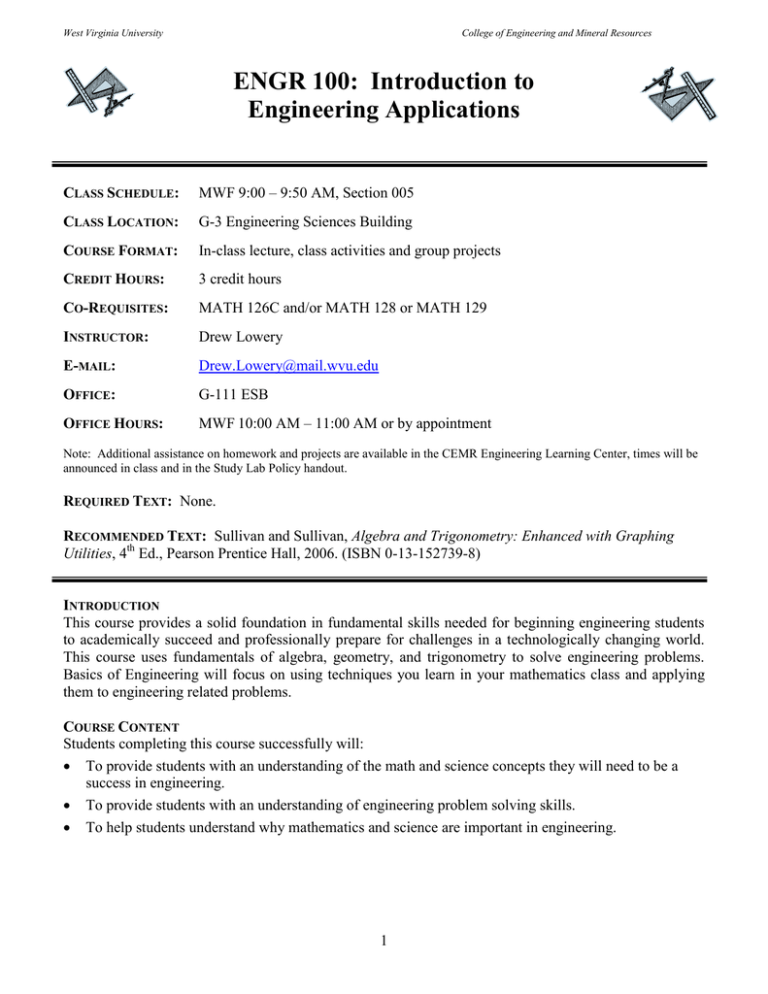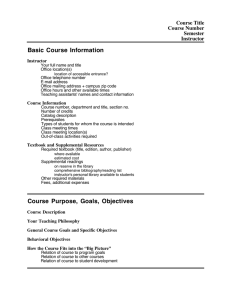
West Virginia University
College of Engineering and Mineral Resources
ENGR 100: Introduction to
Engineering Applications
CLASS SCHEDULE:
MWF 9:00 – 9:50 AM, Section 005
CLASS LOCATION:
G-3 Engineering Sciences Building
COURSE FORMAT:
In-class lecture, class activities and group projects
CREDIT HOURS:
3 credit hours
CO-REQUISITES:
MATH 126C and/or MATH 128 or MATH 129
INSTRUCTOR:
Drew Lowery
E-MAIL:
Drew.Lowery@mail.wvu.edu
OFFICE:
G-111 ESB
OFFICE HOURS:
MWF 10:00 AM – 11:00 AM or by appointment
Note: Additional assistance on homework and projects are available in the CEMR Engineering Learning Center, times will be
announced in class and in the Study Lab Policy handout.
REQUIRED TEXT: None.
RECOMMENDED TEXT: Sullivan and Sullivan, Algebra and Trigonometry: Enhanced with Graphing
Utilities, 4th Ed., Pearson Prentice Hall, 2006. (ISBN 0-13-152739-8)
INTRODUCTION
This course provides a solid foundation in fundamental skills needed for beginning engineering students
to academically succeed and professionally prepare for challenges in a technologically changing world.
This course uses fundamentals of algebra, geometry, and trigonometry to solve engineering problems.
Basics of Engineering will focus on using techniques you learn in your mathematics class and applying
them to engineering related problems.
COURSE CONTENT
Students completing this course successfully will:
To provide students with an understanding of the math and science concepts they will need to be a
success in engineering.
To provide students with an understanding of engineering problem solving skills.
To help students understand why mathematics and science are important in engineering.
1
West Virginia University
College of Engineering and Mineral Resources
STUDENT LEARNING OUTCOMES
Students completing this course successfully will be able to:
Apply fundamental concepts of algebra to solve basic engineering problems. (1.3a)
Apply fundamental concepts of trigonometry to solving basic engineering problems. (1.3a)
Use basic engineering problem solving techniques. (1.3a)
Utilize concepts of math and science to solve problems involving force, motion, energy, and flow.
(1.3e)
GRADING
Grades are based upon student performance on assignments, quizzes, and projects, as well as upon student
participation in required activities, such as study labs and a variety of outside of class experiences
designed to show students more about the engineering profession. Each assessment tool is weighed as
follows:
50% Exams & Quizzes
30% Homework
5%
Lesson Evaluation
10% Study Lab Participation [See Study Lab Policy]
5% Out of Class Experiences [See OCE Policy]
Note: Graded material will not be kept longer than one semester after the course is completed.
GRADING SCALE
Letter grades are assigned according to the following scale:
A
90% – 100%
B
80% – 89%
C
70% – 79%
D
60% – 69%
F
Below 60%
GRADING POLICIES
Grade assignment for participation in Study Labs is governed by the relevant policy. A copy of the
policy which governs Study Labs will be handed out in class. Grade assignment for completion of
required Out of Class Experiences is governed by the relevant policy. A copy of the Out of Class
Experience policy will be handed out in class. Opportunities for Out of Class Experiences will be
announced in class, sent through email, and/or posted on the bulletin board outside of G-11
Tentative dates for Quizzes and Exams are on the course schedule. There may be additional,
unannounced quizzes. Quizzes may not be made up.
No make-up exams are permitted, except by prior arrangement with the instructor, at the sole
discretion of the instructor.
Assignments are due at the beginning of class on the due date assigned. It is expected that
assignments will be printed out before class starts and handed in on time. Additionally, electronic
copies of assignments may be requested. These electronic copies must also be submitted prior to the
start of class. A 10% penalty will be enforced on all assignments that are one class period late.
Assignments handed in more than one class period late usually will not be accepted or graded.
Extenuating circumstances may be considered at the discretion of the instructor.
All homework, quizzes, and exams are considered individual assignments. Anyone found to be
cheating on any individual assignment will be disciplined according to the University’s policy on
Academic Integrity.
2
West Virginia University
College of Engineering and Mineral Resources
ATTENDANCE POLICY
Class attendance is mandatory unless excused by the instructor. The basis for an excused absence will
follow University policy. Students who are absent from class for any reason are responsible for all
missed work. Students who miss a quiz or an exam will not be permitted to make it up, except in the case
of a documented family or other legitimate emergency. Any exception will be allowed at the sole
discretion of the instructor.
DAYS OF SPECIAL CONCERN
WVU recognizes the diversity of its students and the needs of those who wish to be absent from class to
participate in Days of Special Concern, which are listed in the Schedule of Courses. Students should
notify their instructors by the end of the second week of classes or prior to the first Day of Special
Concern, whichever is earlier, regarding Day of Special Concern observances that will affect their
attendance. Further, students must abide by the attendance policy of their instructors as stated on their
syllabi. Faculty will make reasonable accommodation for tests or field trips that a student misses as a
result of observing a Day of Special Concern
CLASSROOM CONDUCT
Since you are all professionals in training, you are expected to conduct yourself in a professional manner
while in this class. For instance, while the class is in progress, everyone is expected to remove their hats
and sunglasses, put away the newspaper, refrain from eating and drinking, and turn off cell phones.
Please do not force the instructor to remind you that you should behave in a professional manner.
This code of conduct also applies to any out of class experiences you choose to attend. Remember, guest
lecturers have taken time out of their schedules to come and speak at WVU. As a representative of the
College of Engineering you are expected to treat these guest lecturers with the respect due them, and
remember one of these lecturers could end up your future boss. Be sure to act accordingly.
ACADEMIC INTEGRITY
The integrity of the classes offered by any academic institution solidifies the foundation of its mission and
cannot be sacrificed to expediency, ignorance, or blatant fraud. Therefore, I will enforce rigorous
standards of academic integrity in all aspects and assignments of this course. For the detailed policy of
West Virginia University regarding the definitions of acts considered to fall under academic dishonesty
and
possible
ensuing
sanctions,
please
see
the
Student
Conduct
Code
at
http://www.arc.wvu.edu/rightsc.html. Should you have any questions about possibly improper research
citations or references, or any other activity that may be interpreted as an attempt at academic dishonesty,
please see me before the assignment is due to discuss the matter.
WVU STATEMENT OF SOCIAL JUSTICE
West Virginia University is committed to social justice. Our University does not discriminate on the basis
of race, sex, age, disability, veteran status, religion, sexual orientation, color or national origin. The
instructor of this course concurs with that commitment and expects to maintain a positive learning
environment based upon open communication, mutual respect, and nondiscrimination. Any suggestions
as to how to further such a positive and open environment in this class will be appreciated and given
serious consideration.
STATEMENT ON DISABILITY ACCOMMODATION
If you are a person with a disability and anticipate needing any type of accommodation in order to
participate in this class, please advise the instructor and make appropriate arrangements with the Office of
Disability Services (304-293-6700).
3
West Virginia University
College of Engineering and Mineral Resources
IMPORTANT DATES TO REMEMBER – PLEASE MARK YOUR CALENDARS!
Last Day to Register
F 01/16/09
Mid-Semester
F 10/09/09
Last Day to Drop a Class
F 10/30/09
Thanksgiving Recess
11/21/09 – 11/29/09
Final Exam Week
12/14/09 – 12/18/09
TENTATIVE COURSE SCHEDULE
Week
1
2
3
4
5
6
7
8
9
10
11
12
13
14
15
Topic
Introduction, Organizing Information, Dimensions
Solving Word Problems, Algebra / Geometry Review
Polynomials, Factoring
Quadratic equations, Complex numbers
Unit circle, Trig functions, Inverse trig functions, Graphs of trig
functions
Trig identities, Trig equations
Solving inequalities, Lines and circles
Exam #1 Review, Exam #1
Graphs of functions, Graphing techniques, Real zeros of
polynomial functions, Complex zeros of polynomial functions
Sum and Difference formulas, Double and Half angle formulas,
Triangle applications, Law of sines and cosines
Exponential functions, Logarithmic functions, Properties of
logarithms, Exponential and Logarithmic Equations, Compound
interest, Exponential growth and decay
Polar coordinates and their applications, Complex plane
Systems of linear equations
Vectors, Dot Products
Conics, Parabolas, Ellipses, and Hyperbolas
Exam #2 Review
Exam #2
4


